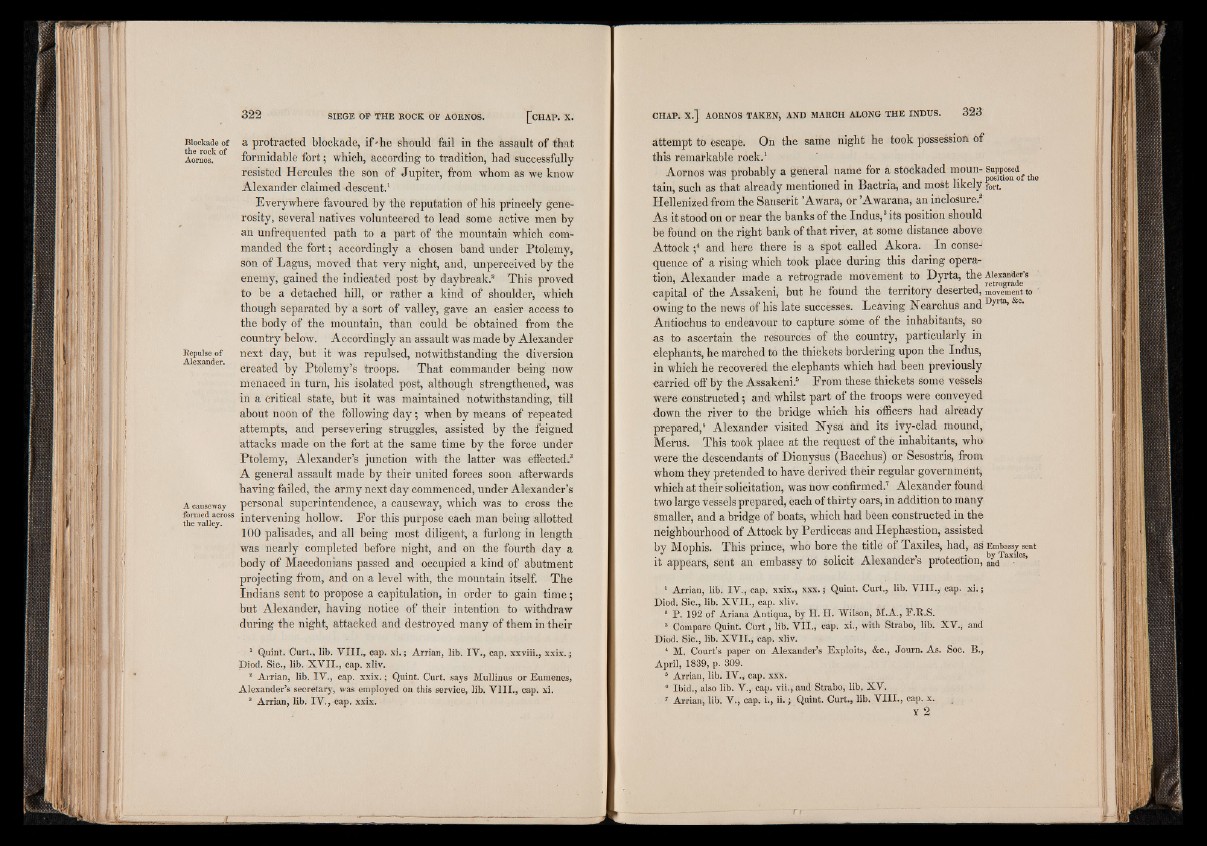
Blockade of
the rock of
Aornos.
Repulse of
Alexander.
A causeway
formed across
the valley.
a protracted blockade, if'he should fail in the assault of that
formidable fort ; which, according to tradition, had successfully
resisted Hercules the son of Jupiter, from whom as we know
Alexander claimed descent.1
Everywhere favoured by the reputation of his princely generosity,
several natives volunteered to lead some active men by
an unfrequented path to a part of the mountain which commanded
the fort ; accordingly a chosen band under Ptolemy,
son of Lagus, moved that very night, and, unperceived by the
enemy, gained the indicated post by daybreak.2 This proved
to be a detached hill, or rather a kind of shoulder, which
though separated by a sort of valley, gave an easier access to
the body of the mountain, than could be obtained from the
country below. Accordingly an assault was made by Alexander
next day, but it was repulsed, notwithstanding the diversion
created by Ptolemy’s troops. That commander being now
menaced in turn, his isolated post, although strengthened, was
in a critical state, but it was maintained notwithstanding, till
about noon of the following day ; when by means of repeated
attempts, and persevering struggles, assisted by the feigned
attacks made on the fort at the same time by the force under
Ptolemy, Alexander’s junction with the latter was effected.3
A general assault made by their united forces soon afterwards
having failed, the army next day commenced, under Alexander’s
personal superintendence, a causeway, which was to cross the
intervening hollow. For this purpose each man being allotted
100 palisades, and all being most diligent, a furlong in length
was nearly completed before night, and on the fourth day a
body of Macedonians passed and occupied a kind of abutment
projecting from, and on a level with, the mountain itself. The
Indians sent to propose a capitulation, in order to gain time ;
but Alexander, having notice of their intention to withdraw
during the night, attacked and destroyed many of them in their
1 Quint. Curt., lib. V I I I ., cap. xi..; Arrian, lib. IV ., cap. xxviii., xxix. ;
Diod. Sic., lib. X V I I ., cap. xliv.
2 Arrian, lib. IV ., cap. xxix. ; Quint. Curt, says Mullinus or Eumenes,
Alexander’s secretary, was employed on this service, lib. V I I I ., cap. xi.
3 Arrian, lib. IV ., cap. xxix.
attempt to escape. On the same night he took possession of
this remarkable rock.1
Aornos was probably a general name for a stockaded moun- Supposed
* J . , » .v i 1 position o f the tain, such as that already mentioned in Bactria, and most likely fort.
Hellenized from the Sanscrit ’Awara, or ’Awarana, an inclosure.
As it stood on or near the banks of the Indus,3 its position should
be found on the right bank of that river, at some distance above
Attock ;4 and here there is a spot called Akora. In consej
quence of a rising which took place during this daring operation,
Alexander made a retrograde movement to • . i m i i •» Dyrta, the Alexander’s capital of the Assakeni, but he found the territory dj eserted, rmetorvoegmraednet to
owing to the news of bis late successes. Le&ving Nearchus and ■ j
Antiochus to endeavour to capture some of the inhabitants, so
as to ascertain the resources of the eountry, particularly in
elephants, he marched to the thickets bordering upon the Indus,
in which he recovered the elephants which had been previously
carried off by the Assakeni.5 From these thickets some vessels
were constructed; and whilst part of the troops were conveyed
down the river to the bridge which his officers had already
prepared,6 Alexander visited Nysa and its ivy-clad mound,
Merus. This took place at the request of the inhabitants, who
were the descendants of Dionysus (Bacchus) or Sesostris, from
whom they pretended to have derived their regular government,
which at their solicitation, was now confirmed.7 Alexander found
two large vessels prepared, each of thirty oars, in addition to many
smaller, and a bridge of boats, which had been constructed in the
neighbourhood of Attock by Perdiccas and Hephtestion, assisted
by Mophis. This prince, who bore the title of Taxiles, had, as Embassy sent
it appears, Sent an embassy to solicit Alexander’s protection, ¡¿a ax
1 Arrian, lib. IV ., cap. xxix., x x x .; Quint. Curt., lib. V I I I ., cap. x i.;
Diod. Sic., lib; X V II., cap. xliv.
3 P. 192 of Ariana Antiqua, by H. H. Wilson, M.A., E.R.S.
3 Compare Quint. C u r t, lib. V l i ., cap. xi., with Strabo, lib. XV., and
Diod. Sic., lib. X V II., cap. xliv.
1 M. Court’s paper on Alexander’s Exploits, &c., Journ. As. Soc. B.,
April, 1839, p. 309.
3 Arrian, lib. IV ., cap. xxx.
“ Ibid., also lib. V., cap. vii., and Strabo, lib. XV.
7 Arrian, lib. V., cap. L, i i . ; Quint. Curt., lib. V I I I ., cap. x. ;